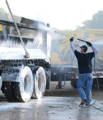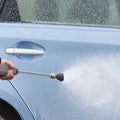Chem 101: What Makes Industrial Pressure Washer Cleaning Solution Work?
Published:
9/17/2021
Every surface requires a different cleaning solution and different pressure levels for optimal results. Some cleaners chemically react to certain surfaces, while high-pressure levels can damage fragile or decorative surfaces.
Having an expert team that can easily navigate different surfaces and environments positions your company to take advantage of the growing demand for pressure washing and other cleaning services. According to PR Newswire, "The global cleaning services market is expected to garner $74,299 million by 2022, growing at a CAGR of 6.2% (2016 to 2022)."
Now is the time to make sure you and everyone in your organization know the fundamentals of how different cleaning solutions work and what different surfaces need to be cleaned. Growing your business to accommodate more surfaces and jobs broadens the market available to you.
In this guide, we'll cover how different pressure washer cleaning solutions work (including both detergents and surfactants), some of the key considerations of using industrial-strength cleaners, and how to best approach different surfaces.

how does pressure washer cleaning solution...Clean?
Cleaning solutions produce a better clean than pressurized water alone. It may seem like the water pressure is the main force that is scraping off dirt and grime from surfaces and that cleaning solutions help loosen it along the way. But the truth behind cleaning solutions is a little more complex. Once you know how it works, applying different detergents and industrial-strength cleaning solutions will become more intuitive.
Detergents
Detergents are a broad category of non-soap cleaning agents. Typically made from synthetic ingredients, detergents are generally surfactants that have been properly diluted for safe use in various cleaning applications.
Surfactants
specific of industrial pressure washer cleaning solution
Industrial cleaners are stronger than residential cleaners. Consumer products are typically diluted by the manufacturer so they are either ready to use from a convenient spray bottle or can be further diluted by consumers at home. However, industrial cleaning solutions are typically sold and transported as concentrates.
This presents several advantages to both producers and buyers, as it saves both parties the cost of transporting the extra weight of the water used to dilute the chemicals. It also allows industrial users to determine to what degree they want to dilute the solution for various surfaces and jobs.
However, dilution isn't the only difference between the two types of solutions. Industrial cleaning solutions also tend to have different, stronger chemicals because they have the safety regulations and experience to safely handle harsher detergents and surfactants. While consumer cleaners may have safer chemicals like vinegar or properly mixed ingredients like oxalic and citric acids, industrial solutions give users more options for mixing and preparing a wide variety of chemicals, including:
- Bleach
- Sodium hypochlorite
- Potassium hydroxide
- And more
These various chemicals are mixed or used to create cleaners, sanitizers, and disinfectants for various field applications.
what to consider when selecting your cleaning solution
Now that we've covered how surfactants work and how industrial and consumer products can differ, it's important to know what chemicals (and levels of chemical strength) work best with different surfaces. Even a single property with different surfaces such as concrete sidewalks, metal wall panels, windows, and branded building sides will need a wide range of cleaning solutions and techniques.
Metal Surfaces
Metal surfaces are strong and are typically treated to handle abrasion, water pressure, and chemical cleaners. However, many metal surfaces are covered in paint, and that's where the real complications arise. Paint generally bonds poorly to metal, so it's easy to cause it to loosen or peel away if the cleaners sit too long or the water pressure is too high.
Plastic Surfaces
Plastic surfaces respond well to both pressure washers and chemical cleaners, requiring low strength levels to get an effective clean. For the best return on investment for plastic cleaning projects, either keep the water temperature low or add less detergent; you don't need much chemical cleaning strength here.
Asphalt Surfaces
Shingles, driveways, and parking lots made from asphalt are oil-based surfaces. Degreasing agents can break down the surfaces quickly, especially on thin roof shingles. Make sure you always use a solvent even though it requires a faster work pace, not a degreaser.
Stone Surfaces
Stone surfaces require a hot, heavily soaped cleaning solution to pull out stains that have been absorbed into the surface. Stone surfaces can include concrete foundations, sidewalks and driveways, brick walls, and most retaining walls. Extremely hot solutions can chemically discolor the stone, but you can pair the process with acid-based toning chemicals to restore it.
Glass Surfaces
Glass is very fragile and is easy to both scratch and break. Use a very mild detergent and a low-pressure level. For a cosmetic clean, work in sections so droplets won't dry and mar the surface.
what to consider when selecting your cleaning solution
Knowing how cleaning solutions work and how they react with different surface types protects your company from costly repair jobs and lost business. It can also help you expand to new markets. For chemical cleaning solutions that can help you tackle any job, contact our team at NorTex Sales & Service. We have locations in Dallas, Kilgore, and Odessa so we can keep your business supplied.
Share this Article ↓




